Editor’s note: Today’s post is by Boštjan Petrič, author of the blog The Fate of Books.
Huh?
What?
I thought this was supposed to be a blog about book collecting?
…
Calm down, everything is OK, it’s still the same blog you left last time. This is a guest post, I’m a book collector and blogger from Slovenia, and I want to convince you that one of the best ways to hunt for rare books is dumpster diving. A lot of ink has been spilled over the years about book auctions and wealthy collectors, but surprisingly little has been written about the least expensive way of book acquisition. Is this because books in the dumpster are such a rare occurrence? Unfortunately, no…
“Do people really throw away so many books?”
Some time ago, a friend and I had a conversation about one of the most important books in Slovenian literary history. “The Baptism on the Savica” (Slov. Krst pri Savici) was written by our greatest poet France Prešeren and came out as a small paperback in 1836 in a print run of 600 copies. Around 30 of these are preserved in libraries, and my friend proposed that some 200 copies should still be extant altogether. My friend is a collector who tends to know all there is to know about books, yet here I felt he was wildly off the mark. Rather than almost 200, I’d wager that no more than 30 Baptisms are still sitting around in private ownership.
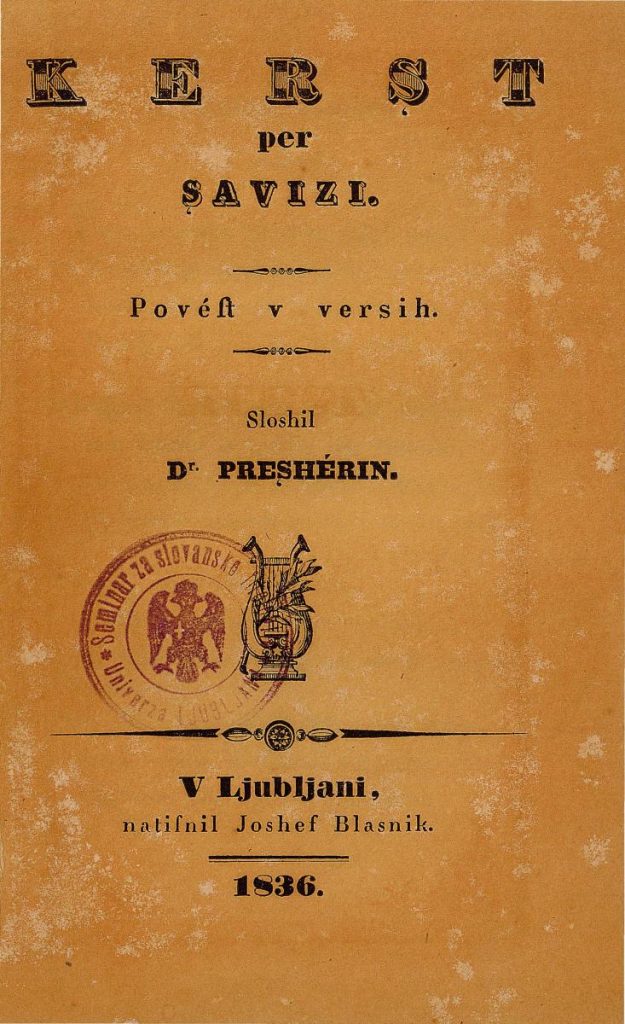
What makes me think so? When book destruction is discussed in the media, it’s usually talked about in the context of disasters: floods, fires, and earthquakes, as well as wars and ideologically-motivated book burning. The conclusion that people like to draw is that some kind of disaster, or persecution, was responsible in each case that a certain book was lost to history. For example, you can still hear that so few Greco-Roman texts remain in existence because they were all burned by the Christians. The implicit assumption is that apart from extreme cases like ideological hatred, people just don’t destroy books. More than once, when I discussed my dumpster finds with friends, I was met with the incredulous stare: “Who the hell throws away books???”
Except, of course, people totally do. Most of my “dumpster” diving happens in the context of bulky waste collections, when people pile up trash in front of their house and it gets picked up by the garbage company the next morning. Based on my experience, I would say that around one in five piles of bulky waste contains at least one book, often hidden inside bags of mixed junk such as toys, office materials, and clothes. And of course, the number of books can be much greater. Every now and then, an entire dumpster or a shopping cart will be full of books, or a bookcase will be brought down to the curb with all the contents still inside.
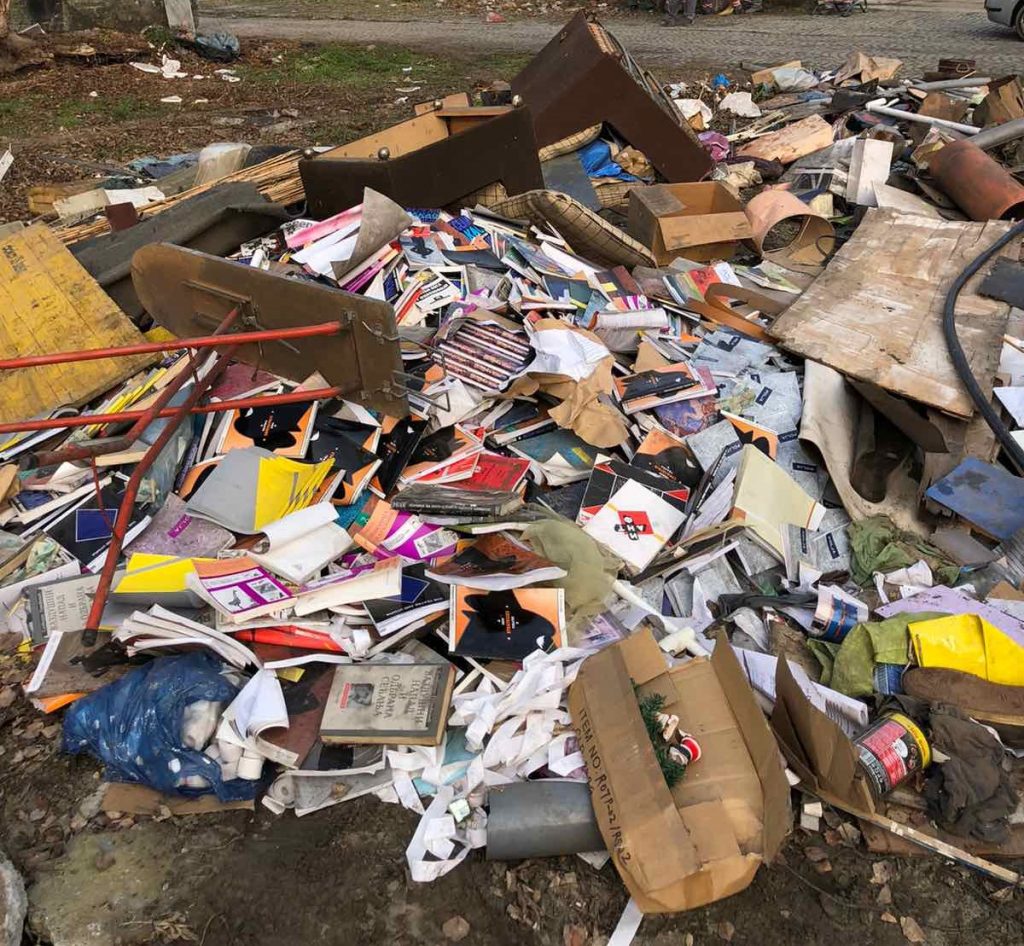
I encounter such a large pile of books about once every two months, but I almost certainly notice only a tiny part of all the trash collections taking place in the city. If I try to extrapolate a bit, I’d say there must be a curbside pile of books or a packed dumpster somewhere in Ljubljana (pop. 300,000) every day – and that doesn’t include all the books that people drive to the dump directly, or sell as waste paper. An acquaintance works for the trash collection company and occasionally passes me tips about spots worth checking out. When I first mentioned that I was interested in books, he spread out his hands: “Oh! Books! We have tons of them, all the time! You could assemble a fortune next to our main conveyor belt! … Too bad you wouldn’t be allowed anywhere near it, though.”
Maybe Slovenians are just unusually ignorant and disrespectful of books? In a way, that would be reassuring, but I highly doubt it is the case. I don’t personally know any dumpster divers from outside the country, but every now and then an article or a blogger gives me a glimpse of the riches to be found beyond our borders. Perhaps the most revealing is a NYT article from 2008 titled “Their House to Yours, Via the Trash.” The journalist followed a group of homeless New Yorkers who made a living by diving for books and then selling them to second hand stores, most notably The Strand. The article’s tone was upbeat, suggesting that a circulation of books “via the trash” is just as fine as any other kind of circulation. Be that as it may, there is little room for doubt that the amount of trashed books in NYC must have been staggering, given that a number of people managed to live solely off the small percentage of volumes that they had chanced upon and that still had resale value.
It follows naturally that books aren’t being trashed just by a tiny number of illiterates. Who are, then, the people who throw books out, and why do they do this? I sometimes chat with folks as they are bringing out their stuff onto the curb, and the impression I usually get is that these are perfectly ordinary people, just as educated and cultivated as anyone else. So why are they trashing all these books? Of course, a desire to free up space is the immediate reason, but this doesn’t explain why the books are being *trashed.* In fact, two assumptions are usually to blame: 1) that the books are worthless, and 2) that nobody wants them. I often hear comments along the lines of “I offered them around to my friends, and this is the stuff nobody wanted.” Have you considered the possibility that your circle of friends might not represent every single preference?
Now, admittedly, our local second-hand stores are notoriously picky about the kinds of books they are willing to buy. But that’s why Slovenia has a number of websites and Facebook pages for selling and giving away second-hand items, and, most notably, little free libraries around every corner. Some of these are indeed little, but others are large bookcases with room for hundreds of volumes. Most have been around for at least a decade, and yet it continues to amaze me how poorly-known they are. Most people I meet are completely unaware of them, despite passing a number of them around town on a daily basis. A while ago, I came across a large pile of books lying on a curb, waiting for the garbage collectors – fifty feet away from a little free library! I talked to the family that was bringing the stuff out, and of course, they had never heard of little free libraries, despite having lived right next to one for presumably quite a long time.
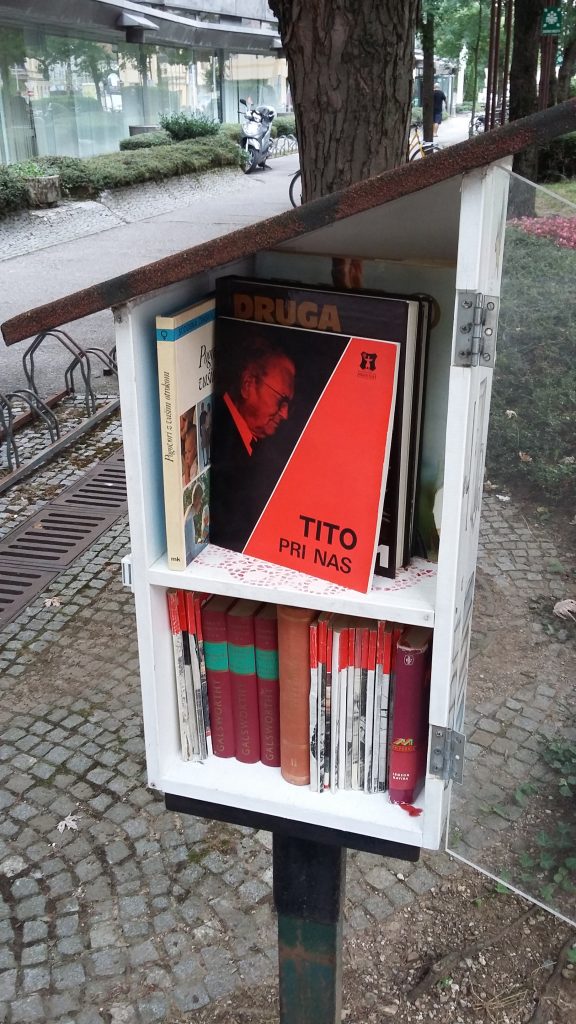
Put all this together, and you can already see why I’m pessimistic about the percentage of Prešeren’s booklets that made it to the present day. Nowadays, Ljubljana has a fair number of second-hand bookstores and charity shops, two flea markets, tons of online spaces to sell books or give them away, *and* a bunch of little free libraries, and yet people still trash books en masse. A hundred years ago, there was nothing apart from a few stores, plus old books were a welcome material for kindling fires and wrapping food. Imagine someone was emptying an apartment in 1900 and found some tiny old paperbacks – what are the odds that these books managed to reach a new owner?
“But are these books really worth anything?”
Okay fine, so I’ve convinced you that tons of books are being thrown out all over the world on a daily basis. But maybe all of these are really worthless, and it’s pointless to try and save them? Well, to begin with, it pays to understand how clueless most non-collectors are about old books. Many believe that value keeps increasing with age, but many also think that it keeps decreasing, and anything from the 19th century is so outdated as to be worthless. Concepts such as first editions can also be hard to wrap one’s head around. I remember talking to an otherwise well-educated friend about a rare first edition from my collection. Her comment was that this same novel had been printed in millions of copies – even she had one at home – so surely my copy couldn’t be that important? I think my friend isn’t the kind of person to throw books away, but it’s easy to see how the average person might dump absolute gems while believing them to be worthless.
I’ve already written about amazing books that people have fished out of dumpsters around the world – salivating stories, but they don’t answer the question, “How likely am I to find something cool in a pile of trash?” By way of an answer, let me list some of the interesting antiquarian items that I found in the trash over the last two years. A blogger friend of mine already reported on probably the most incredible find of my life, a first edition of Dickens that had been presumed lost, so instead of a repetition I’ll direct you to his post. Below are some of my slightly less extraordinary finds, each of which was found on a different occasion:
- A 1912 guidebook to the Croatian coastline, with a Catholic holy image tucked inside that was inscribed from one inmate to another in an Italian concentration camp in 1942
- A top-secret official report of a meeting of the Yugoslav leadership from 1971, called up to terminate the “Croatian Spring” movement1
- “Bushido,” a US Armed Services Edition from 1943
- A 1924 map of the northern Slovenian Alps
- Around fifty 19th-century English paperbacks published by Tauchnitz in Leipzig, including some very rare 1840s and 1850s titles
- A pre-WWI brochure for schoolchildren about the elements of grammar, with no other known copy in existence
- A 1937 guidebook to the Catholic shrine at Sveta Gora near Gorica (Gorizia, Italy)
- A turn-of-the-century poetry manuscript
- A 1940 road manual for travelers, with a pre-WWII postcard from southeast Slovenia tucked inside
- A 1960s primary-school textbook whose owner would become one of Slovenia’s most famous rock musicians; inside are some doodles of his, portraying the Beatles
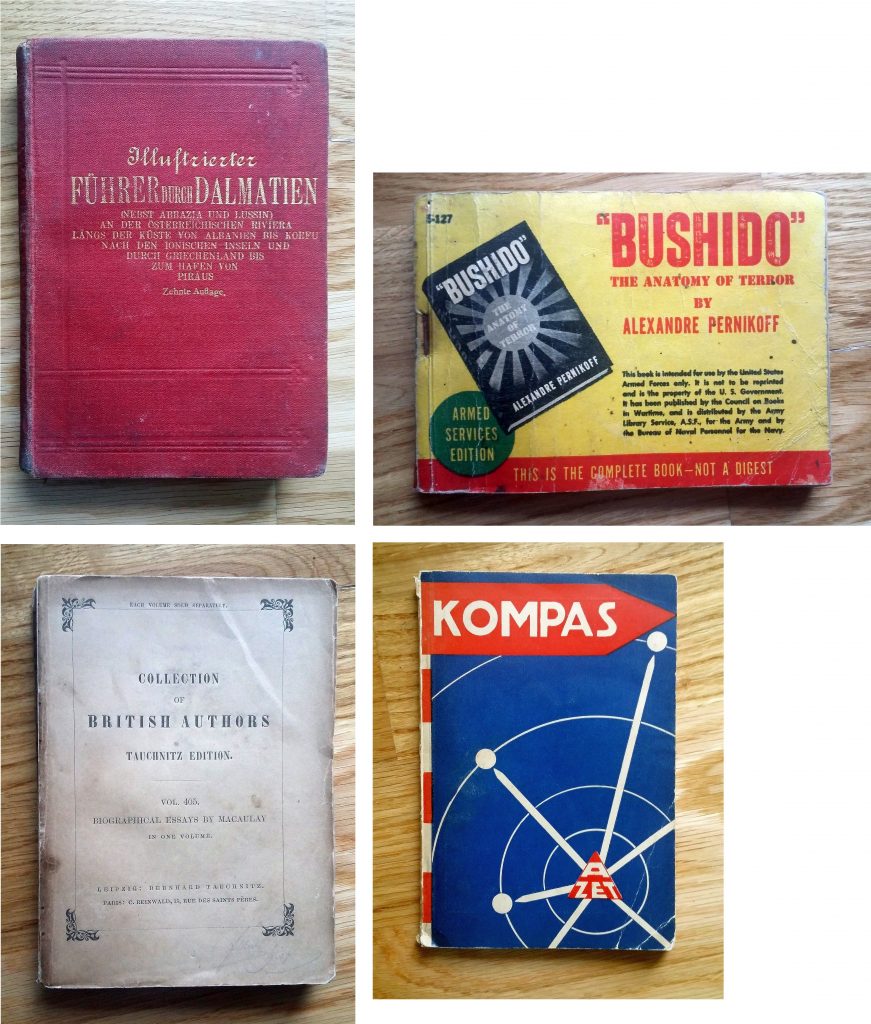
On top of all this, I of course find lots of non-antiquarian material: literature, history, philosophy, children’s books, cookbooks, you name it. Only a small part of my library actually consists of dumpster finds, but that’s because I give most of them away or sell them, and only keep the stuff that really fits inside the collection.
I have a job and several other hobbies, so the above is what one may find more or less randomly, poking around after work and on weekends. What if you’re a professional? Earlier this year, I wrote about Edo Torkar, a Slovenian bookseller who acquired most of his merchandise from junkyards and dumpsters for over two decades. His best finds weren’t just individual items, but entire collections of historical photos, documents, magazines, and of course, books. Torkar isn’t even the only one: a decade ago, a newspaper article (in Slovenian) titled “The Flea-Marketeers” profiled a bunch of garbage-pickers specializing in antiques, including one whose recent dumpster finds included a signed volume by poet-cum-national-hero Rudolf Maister, as well as a print by Miha Maleš and a painting by Tone Kralj – both highly renowned interwar Slovenian artists.
Jumping back across the pond, I cannot but recommend the blog Garbage Finds, run by a dumpster diver from Montreal. He uses it to showcase and sell his finds, only a small part of which are books…but what books! His best find, in my opinion, was a 17th century German translation of the travels of Marco Polo, but apart from that, he has also found piles of rare Judaica and Polonica, Canadian history materials, historical photos, etc. Nineteenth-century material is so common that he barely even mentions it. And this is all just one guy, driving around the city at random, not even doing house calls but limiting himself to trash piles and dumpsters…
“But dumpster diving is dirty and difficult!”
Very well, so I’ve also demonstrated that really cool stuff can be found in the trash, all the time. But this still means you have to pick through garbage, which is smelly and dangerous, right? Not really. Let me share some tips on how to make book rescuing safe and easy; any fellow divers are highly welcome to add their own advice in the comments below.
For starters, you don’t really have to dig around random dumpsters. Sure, books can be anywhere, but most often they are trashed when people are renovating or moving. Look around for large curbside piles of trash that suggest someone is clearing out an apartment – trinkets, clothes and tableware are especially indicative of books nearby. Such piles are unlikely to contain anything very dirty or unsafe – exercise the same caution that you would if you helped clean out a friend’s cellar, and you’ll be fine. A dumpster filled with this sort of material usually won’t even smell bad. I would advise against literally jumping inside, though, unless there is only a very small amount of trash at the bottom. Does your area have special recycling dumpsters for paper? Check the ones next to a pile of bulky waste, they might contain all the books that used to sit on the now-empty shelves on the curb.
Where do you find all these trash piles? Well, it always pays to just walk around a lot, especially in dense residential areas and especially in the evening (or, if you’re totally unlike me, very early in the morning). If your area has bulky waste collections scheduled on specific days, look that up. In some towns, such as here in Ljubljana, there are Facebook pages where people can post interesting trash piles for others to share in the spoils – look that up too. Do you know anyone who works as a garbage collector? They might be able to set aside interesting books for you, give you tips on where to look, or even let you inside the main area where trash is processed! It also pays to know people who work in the moving business or in construction – they will often be allowed to take stuff home from buildings about to be renovated.

Should you (middle-class reader) feel bad about taking stuff that poor and homeless people could use to earn some desperately needed money? I considered this a few times, so I did a simple experiment – when I found nice books in the trash, I would leave them around until just before collection time. They were almost always still there when I came back. My conclusion is that there are simply too many books out there and not enough people to rescue them all in the narrow time slots available. Don’t be afraid to move into the book salvaging business – if you feel bad about the homeless, help them out with a few dollars instead.
Last, is sifting through garbage demeaning? Absolutely effing not! When I read about other people’s dumpster finds, the finders often sound so apologetic: “I couldn’t resist taking the books, because it simply felt so awful to see them go to waste…” Have some pride! You’re doing a favor not only to yourself, but to readers and collectors now and in the future. I recently came across a German book with the note penciled inside in Slovenian, “Picked up at the garbage dump, Stalag IIa, Germany, 1941, [signature].”2 A POW went out of his way to rescue this book and preserve it, even though it was of little value and written in the captors’ language. 80 years later, the book is still here. Thanks, unknown book rescuer! If he could do it, you, blog reader, can do it too!
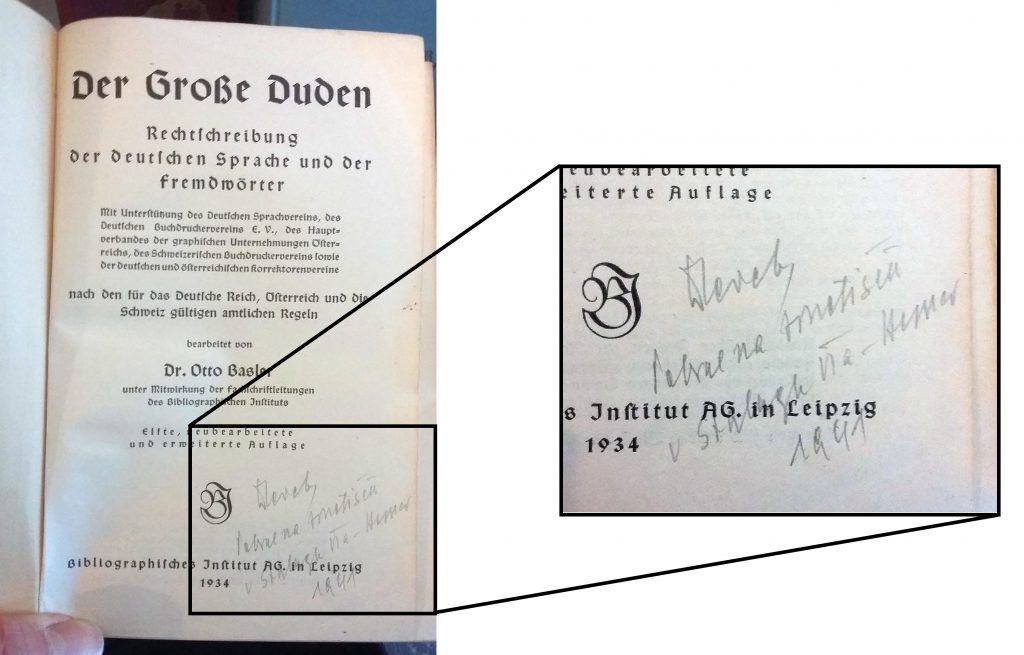
1For those into Yugoslav history: the “Croatian Spring” was a liberal nationalist movement that gained power inside the Croatian communist party in the 1960s. After some hesitation, president Tito decided that the Croatians had gone too far, forced their leaders to resign, and returned the entire country to hardline communism for the rest of his life. The meeting at Karađorđevo palace that was called up to terminate the Croatian Spring is considered one of the most important events in Croatia’s Yugoslav-era history, making my report a pretty important one.
2Stalag (short for Stammlager) was a German prisoner-of-war camp for enlisted men. Stalag IIa was located next to the city of Neubrandenburg in present-day northeast Germany and housed a number of POWs taken prisoner during the attack on Yugoslavia in 1941.
Boštjan Petrič has been in love with books as long as he can remember, but only began to think of himself as a collector about five years ago. His main collecting interest is historical material (pre-1950) dealing with Slovenia and the neighboring regions. He founded The Fate of Books with two goals in mind: first, to share stories of bookmen and bookwomen with a global audience, and second, to publicize cases of “libricide” or book destruction, thereby motivating people to rescue books.





One thought on “Why YOU Should Take Up Dumpster Diving”